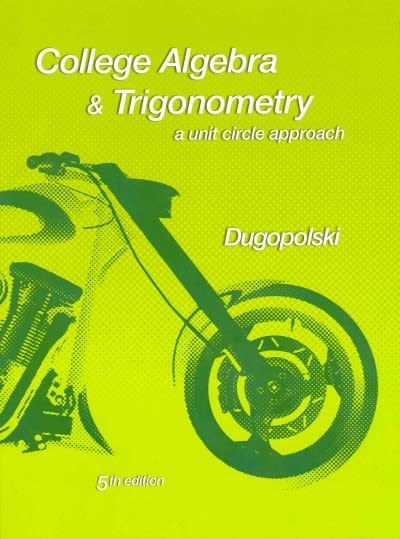Question
1 A sports researcher gives a random sample of Mission college students a questionnaire asking how many minutes they exercise this week. Out of 200
1
A sports researcher gives a random sample of Mission college students a questionnaire asking how many
minutes they exercise this week. Out of 200 Mission College students given the questionnaire, 100 filled it out
and returned it. Based on this questionnaire, the researcher concluded that the average Mission College student
exercises for 3.5 hours each week. Select one option below:
a.
This study will not suffer from any kind of bias.
b. This study will suffer from response bias, but not non-response bias.
c.
This study will suffer from non-response bias, but not from response bias.
d. This study will suffer from both response bias and non-response bias.
2
In problem 1, what is the frame: (Select one)
a.
All California adults who participate in sports.
b. All Mission College students.
c.
Everyone who cares about their health.
3
A congressional district consists of three areas which are different in economics, culture, and ethnic mix. A
political pollster wants to do a proportional stratified sample. Area 1 has 25,000 residents, Area B has 50,000
residents, and Area C has 75,000 residents. The total sample size will be 3000. How many from each area
should be in the sample?
4
Before Dr. David Ho developed the "Three Drug Cocktail" for treating AIDS (which is now the standard
treatment) the only effective treatment for AIDS was AZT. Unfortunately, AZT had limited effectiveness: it
slowed the progress of the disease, but did not provide a cure, and almost everyone treated with AZT eventually
died. When the "Three Drug Cocktail" went into clinical trials, the patients were randomly assigned to one of
two groups. Sample #1 got the new, unproved "Three Drug Cocktail" treatment, while sample #2 was treated
with AZT. The patients did not know which treatment they got, nor did the doctors who evaluated them know.
The patients were evaluated at a single point in time after treatment was completed. The sample treated with
the "Three Drug Cocktail" did so much better than the sample treated with AZT that, in accordance with US law,
the experiment was halted and all the patients were given the "Three Drug Cocktail". The "Three Drug Cocktail"
is now the standard treatment (although it has been improved since the original clinical trials) and AIDS is now in
most cases a chronic, treatable disease rather than a terminal illness.
a.
This is an observational study. TRUE FALSE
b. This study proves that the "Three Drug Cocktail" is a better treatment than AZT. TRUE FALSE
c.
In statistical terminology, what is the "treatment" in this study?
d. This is a double blind study. TRUE FALSE
e. This is a cross sectional study. TRUE FALSE
5
Using the same data as problem 3 (the "Three Drug Cocktail" clinical trials) what is the control group?
a.
The sample who took AZT.
b. The sample who took the "Three Drug Cocktail".
c.
The scientists who organized the study.
Required Homework 1
6
An educational study attempts to determine if poorly performing grade school teachers can improve if they are
mentored by an experienced teacher who is a high performer. 200 poorly performing teachers were grouped
into pairs; the two teachers in each pair were performing at the same (low) level. For each pair, one received
mentoring and the other did not. (The choice of which would be mentored was random.) Their performance is
evaluated again a year later.
This is systematic sample. TRUE FALSE
This is a matched pair design. TRUE FALSE
This is a designed experiment. TRUE FALSE
What is the treatment in this study?
What is the response variable?
7
An educational study is planned to determine whether having taking a music class reduces the chance that a
student will drop out of high school. The study is performed in three high schools with a high dropout rate.
Before the study none of the high schools had music classes (due to lack of funding). Students are randomly
assigned to either take a music class or not to take a music class. The study finds that students who take music
are less likely to drop out.
Which group of students is the control group?
8
A department store wants to get an idea of how satisfied their customers are. The store assigns an employee to
interview every 100
th
customer leaving the store. This is an example of (select one):
a.
A designed experiment (controlled experiment).
b. The use of a placebo.
c.
A systematic sample.
d. Multistage sampling.
9
In the 19
th
century, both physicians who treated humans and veterinarians had few effective remedies for their
patients- therefore, placebos were sometimes used. Would you expect that a placebo would have more effect
on a human patient, more effect on a farm animal treated by a veterinarian, or an equal effect on both? Give a
reason for your answer.
10
In the US presidential election of 1932, Democrat Franklin D. Roosevelt defeated incumbent Republican
president Herbert Hoover. Shortly thereafter, the magazine "The New Yorker" published a cartoon showing a
lady wearing a mink coat and a pearl necklace saying "I don't know how this happened, everyone I know voted
for Hoover." What was this lady's statistical error?
a.
Her friends are not a random sample- if she can afford a mink coat and pearls, her friends are probably
rich too, and rich people tend to vote Republican.
b. Obviously, her friends didn't turn out to vote- she should have made sure they actually voted.
Step by Step Solution
There are 3 Steps involved in it
Step: 1

Get Instant Access to Expert-Tailored Solutions
See step-by-step solutions with expert insights and AI powered tools for academic success
Step: 2

Step: 3

Ace Your Homework with AI
Get the answers you need in no time with our AI-driven, step-by-step assistance
Get Started


